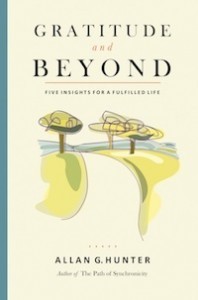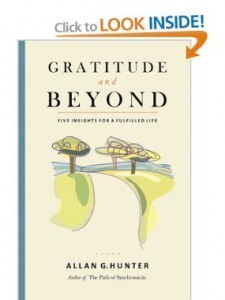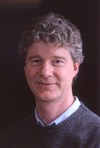Allan G. Hunter's Blog, page 66
April 1, 2013
Gratitude and Beyond: The first Review
http://newconnexion.net/new/index.cfm...
Here’s the review:
Gratitude and Beyond
Five Insights for a Fulfilled Life
By Allan G. Hunter
Findhorn Press, 2013, $14.95
What can we learn from those who have faced death and survived? According to Allan Hunter, near death experiences (NDE), which are often mysterious and inexplicable, can also be dramatically transformative for those who undergo them. Some survivors radically change their lives afterwards. The question is: Why?
In his new book, Gratitude and Beyond: Five Insights for a Fulfilled Life, Hunter reveals that his own near death experience was a catalyst, a “wake-up call” that contained lessons about living, not only for him as survivor but for all of us. Of course, you don’t have to face death to get these lessons. In the book he shows how the insights revealed to him (gratitude, humility, beauty, innocence and place in nature) are available to everyone. By cultivating them, says Hunter, we are able to come into alignment with our “true” self and in turn live in fulfillment and to our fullest potential.
Essentially, these five insights are like a road map to living. To further articulate them and his ideas, Hunter uses the pentacle or five-pointed star to visualize and aid in their discussion and exploration. He demonstrates how they are interlinked and mutually supporting with LOVE at the center, a compassionate, selfless, allowing, generous and unconditional love. It’s a simple but effective tool for unlocking a truth we all know but sometimes need to be shocked into remembering — that life is a beautiful gift. In the book, Hunter successfully shows that the positive emotion of gratitude can take you further than you ever thought, perhaps even to the realization that you have been given the gift of life and you can give back.
Gratitude and Beyond
This link should take you to an extract from the new book. Take a look…
March 30, 2013
A Video done by friends of Mine: Let me know what you think
March 27, 2013
Literally?
When the Conquistadores came to South America they were looking for wealth, especially gold. They found plenty. After a while they started looking specifically for El Dorado, the king who was said to be so wealthy he covered himself in gold dust every day and washed it off each night. Many of those expeditions in the early part of the sixteenth century were fuelled by such a vision. Countless people died as a result. The figures are probably in the tens of millions.
The Spaniards who worked themselves and others to death for this myth of gold felt that these tales of El Dorado were literal. They were factually true, they felt. Native Americans were not thought to have the power of thinking abstractly.
To the Indians of the Americas, though, the stories never were “true” in a factual sense. They were metaphorical. El Dorado was the myth of a kingdom in which everything was well-regulated and plentiful, and so gold had no power to motivate anyone. It was simply decoration, to be enjoyed. Like a bowl of flowers that could be savored and then cast aside when they faded, gold had no real value in their vision.
The Spaniards were too literal. And their heirs now own a land far more desolate than before.
Perhaps we could learn from them as we pursue our own ideas of wealth?
March 23, 2013
The War on Drugs
It costs a fortune. It gets people killed. It fills our jails and doesn’t seem to make a difference.
How about if we re-frame the argument?
People turn to drugs and sell drugs on the street because they are desperate and poor. If offered a chance to make an honest, decent living most people would not turn to crime.
So the problem is not drugs, the problem is poverty.
Yet instead of alleviating poverty what we do is give money to agencies that are already full of people who have graduated high school and college, and we ask them to be policemen, build jails, run law courts and so on. So we’re giving money to people who aren’t poor, while the problem is poverty.
If we were to take the War on Drugs money and put it into building schools, making life liveable for working single mothers, and ensuring that children feel cared for we might change things. Put the money back where it can benefit the poor directly. Some of this money might be wasted, sure. But right now almost all of it is being wasted.
March 19, 2013
Getting things Straight
Joseph Campbell’s famous advice was “Follow your bliss”.
Many people one reads or listens to seem to echo that by saying “Do what brings you joy” — or variants of this idea.
What they don’t stress, perhaps, is that following one’s bliss and experiencing joy are not all fun and games. Following one’s bliss can take any one of us to some scary places, some of them dangerous and exhausting. Joy, for many of us, is exactly what we will not allow ourselves to feel because we’re afraid of how easily it could evaporate. This kind of defensive thinking, the kind that won’t allow you to feel the joy or the bliss, is very familiar to us all.
Joy and bliss will come, but they will not show themselves as the cliche version of happy smiling faces all the time. Talk to anyone who has served the dying in a hospice. Many will tell you that this is the only job for them, even though each person they care for dies. There exists a bliss, a sense of purpose, a joy that is far deeper than mere success.
Cultivate deep bliss. Honor deep joy.
March 15, 2013
Double Standards and Deeper Spirituality
When I was a child I used to go to church with my family and learn all about the Holy Spirit. Then I’d go right back to school on Monday and live my usual petty, self-involved and mean-spirited life. There was no problem with this – that’s what everyone seemed to do and I’d just as well get on with it.
When I grew a little older I found myself applying a few rather unpleasant descriptors to this double standard of Jesus on Sundays only. I used to think it was hypocrisy, and of the foulest kind. This allowed me to feel above it all, and less hypocritical myself.
As I went through my life I began to alter my views. I began to think of this Sunday Holiness as what Marx had once called “the lie in the soul” – a lie so deep that we actually believe it. The problem then was indoctrination, I thought, and the solution was to fight against the social indoctrination I perceived as so pernicious. And so I fought.
These days I see things differently. What seems clear now is that this double standard is what every human being faces. It’s not enough to decry it or complain about it. The reason is that we live in a world that is hinged on dualism. We are spiritual beings who are here having a human experience. This means that we cannot be fully unified with the spiritual world simply because we’re here, on earth. The whole point is to be in dualism, and to deal with that as best we can from our limited ability to grasp unity.
The double standard of Sundays which was for so long so distressing to me, is really not something to be angry about. It is instead to be seen as a dramatic re-enaction. Each Sunday or Sabbath or Holy Day we remind ourselves not simply that we have to pay attention to what is eternal on that day – we remind ourselves that because we are human we find it very difficult to stay in the place of holiness for long. We can manage it, if we’re lucky, about one day a week.
Once we accept this we can start to work towards a deeper spirituality.
March 10, 2013
Magic — and Bay Path College Writers
Yesterday I spent a magical afternoon with the Memoir class at Bay Path College.
I don’t use the word “magical” lightly — magic is what happens when inquiring souls speak their truths with honesty and courage. When that happens they give permission to everyone else to become a more authentic version of themselves than ever before. And so the magic grows.
It took some hard work, though. Painful things were recalled, and confronted. Humorous events were recounted and relished. Pranks that had lain unthought of for years came to glorious light with gusts of laughter. Past selves were brought forward for love and appreciation. And they did all this by themselves, by sharing.
It was a deep privilege to be in the room with so many wonderful people as their souls stepped forward. Yes, it was magic.
March 8, 2013
Choosing a life: Choosing Happiness
Choosing A Life
My old college chum, Adam Phillips, has written his seventeenth book on psychoanalysis: “Missing Out”. It’s got a compelling premise – he writes about how the life we haven’t lived can haunt us and undermine the way we feel about the life we have.
It’s an interesting starting point, suggesting that we torture ourselves into discontent, thus turning a perfectly fine existence into a cavern of self-reproach.
Somehow I can’t buy it, totally. Of course, people do live this way, and it’s a heartbreaking thing to witness. Yet it seems to me that happiness is always a choice. When we look at our lives we must realize that we have in fact chosen just about everything in our world. We could leave our job, our spouse, our children, even the country itself, but we choose not to. When we realize that this choice is something we selected, we can feel differently. I chose this spouse, this companion, not the other; I did so for reasons that suited me at the time, and I stay in the relationship for similar reasons.
We choose the life we have and in the process we are presented with important lessons that the soul has to come to terms with. Pretending that our lives could have been different merely stops us learning the soul lessons. That’s the real nub.
It’s time to learn those lessons.





